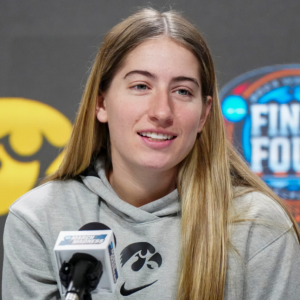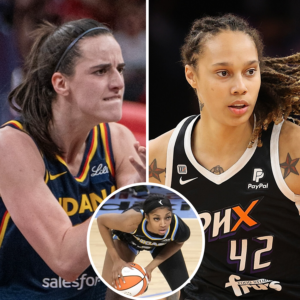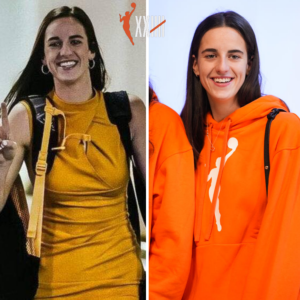The driveway at the McDaniel home in Cold Spring ends in a basketball hoop.
It’s a narrow space. A baseline jumper, unless it’s little more than a put-back, isn’t happening.
But the driveway is long, which suits Camilla McDaniel’s game just fine.

The Haldane senior is thinking of playing college basketball. She’s heard from a few schools. At 5-foot-7, she’s not short, but she’s also not someone who college programs would station under the rim.
While she’s quick and can drive, her biggest strength is her outside shot. The 3-pointer, to be specific.
The 3-pointer has been getting a lot of attention lately.
Basketball’s wunderkind, Caitlin Clark, has brought more attention to women’s basketball than ever before. Her overall game is a thing to behold, but Clark’s ability to drain shots seemingly from Mars is what has made her a national sports hero.
Clark made more 3-pointers from 25 feet out or farther than any other female or male college player since the stat was first recorded five years ago. She hit from 35 feet with apparent ease.
Clark’s ability has put a spotlight on the 3-point shot and will no doubt help spark a generation of future 3-point shooters, among both girls and boys.
But well before Clark’s from-another-ZIP-code shots were being played on nightly sportscasts that previously devoted little time to women’s games, kids like McDaniel were nailing 3s too.
The rise of the 3-pointer
McDaniel loves to shoot long. Anywhere and anytime.
In the driveway, she takes on her dad, Jeffrey, in 3-point horse contests. She’s the better 3-point shooter, she contends, saying her dad “tries, though.”
She gets it done on the varsity courts, too. McDaniel surpassed 100 career 3-pointers by draining 74 during her recently-concluded final season at Haldane.
It wasn’t like she was forgotten and left unguarded.
“One of my favorite things is when a coach yells out to watch for No. 3 and, then, taking a 3 and making it,” McDaniel said.
She’s not the only one. During the Section 1 girls and boys basketball playoffs at the Westchester County Center this past winter, players drained 3-pointers from all over the court.
Gina Maher has witnessed the evolution from a front-row seat.
Officially, the National Federation of State High School Associations and National High School Federation approved 3-point shots for high school basketball to begin in the 1987-88 season. But never every state and league adopted the 3-point shot right away.
Flipping through part of her huge collection of old scorebooks, Maher, the 800-plus-win girls coach at Irvington High, found the first 3-pointers in Section 1 history falling during the 1990-91 season.
Maher figures the popularity started to grow a decade ago before recently exploding,
“I think it was coming 10 years ago but it has been a big, big, big difference,” she said. “The last two years, it has become an immense part of basketball.
“Even in 2010, not a whole lot of kids were hitting a lot of 3’s. But you look at the teams that won sectionals this year and all have girls who can it the 3. It’s definitely a big part of basketball today, both male and female. But you can’t just get away with (only) the 3-point shot.”
3-pointers and college recruiting
Longtime Ossining coach Dan Ricci, who has guided teams to five state titles and sent three players to powerhouse UConn, has long found success with the 3.
The state record book lists Ossining’s Soniya Chong, who went on to become a multiple-time national champion at UConn, as the single-season record-holder with 106 3-pointers in one season. Former Pride players Andra Espinoza-Hunter and Julia Iorio are tied for second place. Of the top 20 spots on that list, Ossining players hold 10 of them.
“We’ve always shot a lot of 3s. … We’ve shot a lot of 3s off the fast break,” Ricci said. “My philosophy is I’d rather have them take a wide-open 3 than a contested 2. You have a lot better chance (with a 3) than shooting over someone 6-2.”
Girls’ success at hitting from long range doesn’t surprise the 35-year coach. While he considers boys generally better at driving to the rim, he thinks girls are usually better shooters.
He remarked he’d put Chong and Espinoza-Hunter against just about anyone in 3-point shooting. He noted it wasn’t unusual for them to hit from eight feet behind the 3-point arc.
Maher says colleges are always looking for shooters, but she stressed that players have to be able to do more than just shoot 3s.
But the 3 can certainly make a difference in whether someone is recruited.
This year, Ossining senior Zoey Jowers, who hit around 10 last year, nailed 40 3-pointers. Junior Sinaya Bell, who wasn’t a 3-point shooter as a sophomore, made more than 30.
At 5-foot-9, Bell wants to play in college and looks at the 3 as something that has expanded her game. She said college teams have boosted the “image” of the 3 and inspired younger players to work on the shot, which she said requires good arm positioning and powerful leg drive, rather than huge upper-body strength.
“Any one of us can shoot it if we work on it,” she said.
‘It’s trendy at the moment’
Tappan Zee girls head coach Riley Chevrier née Harrington got a full ride to play basketball at St. Thomas Aquinas in Sparkill at just 5-foot-3.
She was a key member of Maher’s 2010 state-championship Irvington High team as a senior. Speedy and a gifted passer, she was also a good outside shooter.
But as much as Chevrier recalls working on outside shooting in practice, she said Irvington didn’t have a set play for taking a 3.
“If you had one, you’d take it,” she said.
While the information can no doubt be found in Maher’s scorebooks, Chevrier has no clue how many 3-pointers she made in high school, saying that’s not really something they kept track of or thought about.
Now, she keeps track of her TZ team’s 3-pointers. She said junior Kristen Phelan made more than 40% of her 3-point attempts this winter, a percentage topping even Kennedy Catholic star Madison Carlo, who MaxPrep lists at No. 4 among high school girls in New York last season with 84 3-pointers made.
When she was in high school, Chevrier said Ossining was a hard-to-defend exception.
Now?
“Teams hit them just like a free throw,” she said. “I think it’s becoming harder and harder for players to not have that as part of their games.”
“It’s really trendy at the moment,” she continued, remarking that media and social media − which she terms a “whole different animal” − are fueling the popularity.
For players like McDaniel, the 3 will always be part of their game.
“They can change the energy,” McDaniel said. “A big 3 that’s made really shifts the atmosphere.”
News
BREAKING: Kate Martin sparked controversy on social media when she demanded that the WNBA organizing committee review the VAR and ban Angel Reese from playing for her unsportsmanlike act of punching Caitlin Clark in the head. “We must eliminate the dirty elements to make the game cleaner.”
Kate Martin has sparked a social media uproar by publicly calling on the WNBA organizing committee to review the incident using VAR and to ban Angel Reese from playing. This demand stems from Reese’s unsportsmanlike conduct, where she was seen…
Brittney Griner asked Angel Reese instead of Caitlin Clark to compete in the 3×3 Olympics after Cameron Brink suffered an injury. I think “Angel Reese is better than Caitlin Clark”, causing fans to argue fiercely on social media.
In a surprising turn of events, WNBA star Brittney Griner has chosen Angel Reese to compete in the 3×3 Olympics, following an injury to Cameron Brink. Griner’s decision, and her accompanying statement that “Angel Reese is better than Caitlin Clark,”…
Caitlin Clark’s GPA Has Been Revealed In The Wake Of Her WNBA Debut, And It Will Shock You
Caitlin Clark (Photo via @caitlinclark22/Instagram) Caitlin Clark was bossing college both on the court and in the classroom. The new Indiana Fever guard left the NCAA as its highest-ever scorer and has already put on a show in the WNBA, having made her professional…
David Portnoy Slams Team USA for Excluding Caitlin Clark from Olympic Roster, Citing Missed Opportunity for Women’s Basketball
You can love Caitlin Clark. You can hate Caitlin Clark. You can love her Iowa roots. You can hate her Iowa roots. You can like her because she’s white or dislike her because she’s white. The same goes for being…
Indiana Fever Rookie Caitlin Clark Causes A Massive Stir With Her Unusual Social Media Activity
Caitlin Clark (Photo by Maddie Meyer/Getty Images)© Provided by Total Pro Sports Caitlin Clark made a curious move on social media this week, liking a certain post. The Indiana Fever point guard has made it a point to let folks know…
OUT OF BOUNDS: David Portnoy – El Presidente harshly criticizes Team USA for leaving WNBA rookie sensation Caitlin Clark off its Olympic roster. The Barstool Sports founder argues that the league missed a golden opportunity to grow women’s basketball.
Barstool Sports founder David Portnoy, better known online as “El Presidente,” is throwing shade at the selection committee behind the USA Women’s Olympic Basketball team. The controversy? The omission of WNBA rookie phenom Caitlin Clark from the roster. Clark, a…
End of content
No more pages to load











